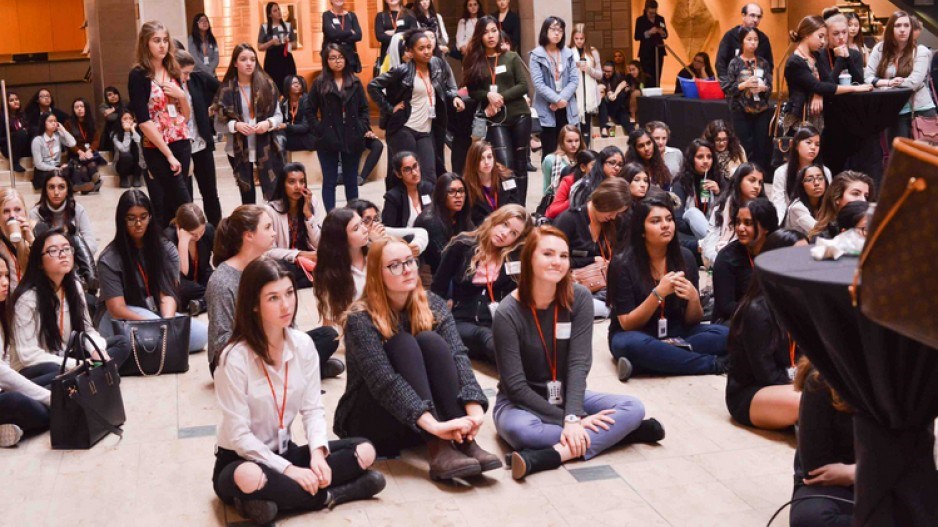When Caroline Pennock was in Grade 10, she knew that she wanted to attend university but was unsure what she wanted to study. That changed when her teacher told her she should attend an event called SheBiz, a daylong conference where she and her fellow students could learn from successful female women from a variety of businesses and industries.
“My favourite part of the day was to hear from a woman at PricewaterhouseCoopers who spoke about her job as an accountant,” said Pennock. “I thought it would mean sitting alone in a room doing math all day, but when the woman spoke about her job it sounded exciting.”
Pennock now intends to apply to Queen’s University’s commerce program in Ontario and hopes to one day become an accountant.
Hundreds of young women in high schools across Vancouver are being given the same opportunity as Pennock to learn about the career opportunities available in business and technology.
SheBiz was created by Women in Capital Markets (WCM), a network of professional Canadian women that advocate and work to increase the level of women in leadership position across traditionally male dominated industries.
This is the first year WCM has brought its successful Toronto event, SheBiz, to the West Coast. Tickets for the Nov. 4 event sold out in a matter of weeks and over 250 students from 12 high schools attended.
“I don’t think when you’re young you make the connection that if you’re in a business role you get to have a real impact on the world around you, you get to have an impact on the environment, you get to have an impact on what’s on shelves in stores, what your phone looks like and all those sorts of things,” said Jennifer Reynolds, president and CEO of WCM. “Those types of roles are really interesting … and add value to society. The reality is we don’t have enough women in those roles. I think that women will have a very unique, innovative and different approach to many of the problems we face in business today.”
According to Statistics Canada, while women receive higher high school marks in science, technology, engineering and math than do men, they are less likely to enrol in those programs in university than their male counterparts.
This is a concern for Reynolds, who said evidence shows that having more women in leadership roles is good for individual organizations and the economy as a whole.
“There’s all kinds of studies around what diversity of thought brings to the table, whether that’s ethnicity or that’s gender,” said Reynolds. “There’s a strong business case that businesses need that diversity so I think it’s a question of competitiveness for the Canadian economy.”
Reynolds said there are a number of factors that result in fewer women being in leadership roles and in science and technology. The easiest one to fix, she said, is an information gap – young women need to be informed of the opportunities available for them and that WCM can help.
The more difficult problem to overcome is the lack of women established in those fields who can help other women gain entry, she said. SheBiz hopes to change this by creating an environment in which high school students can learn from, and network with, successful women in business leadership roles across a range of technology sectors.
“Women are 62% of the graduates today and yet they’re absent from leadership roles in the economy and boardrooms,” Reynolds said. “This is a problem, we’re not using our talent pool if we’re not using everyone that’s graduating from university.”




